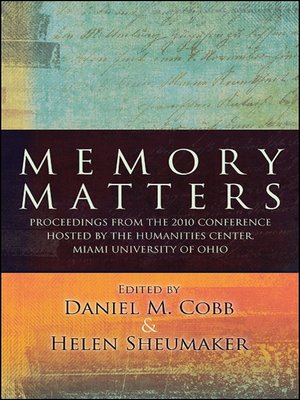Memory Matters
ebook ∣ Proceedings from the 2010 Conference Hosted by the Humanities Center, Miami University of Ohio
By Daniel M. Cobb

Sign up to save your library
With an OverDrive account, you can save your favorite libraries for at-a-glance information about availability. Find out more about OverDrive accounts.
Find this title in Libby, the library reading app by OverDrive.



Search for a digital library with this title
Title found at these libraries:
| Library Name | Distance |
|---|---|
| Loading... |
Explores how the process of memorialization keeps the past alive in the present and shapes the way we imagine our possible futures.
"The past is never dead. It's not even past." - William Faulkner
The three thought-provoking essays in Memory Matters explore how the process of memorialization keeps the past alive in the present and shape the way we imagine our possible futures. The product of a one-day symposium hosted by the Humanities Center at Miami University of Ohio, it focuses on issues of commemoration in the contexts of U.S. history, Native America, and museums. In "From Lexington and Concord to Oklahoma City: The Perils and Promise of Public History," Edward T. Linenthal offers a fresh perspective on creating national memorials. In "The Remembered/Forgotten on Native Ground," Daniel M. Cobb draws upon Benedict Anderson's notion of the "remembered/forgotten" to explore the work of memory at the sites of the Battle of the Little Bighorn, the Wounded Knee Massacre, and the Miami Removal. And in "Museums Matter," Helen Sheumaker explores how museums function as repositories and creators of cultural memory. The volume also includes a transcript based on the question-and-answer session following the original presentations. Stemming from a two-year scholarly project, "Memory and Culture: Engaged Scholarship, Multidisciplinary Connections, and the Public Humanities," Memory Matters provides scholars and those interested in such fields as museum studies, memorial studies, and cultural history with provocative discussions of the ways in which representation, power, and memory intersect.







